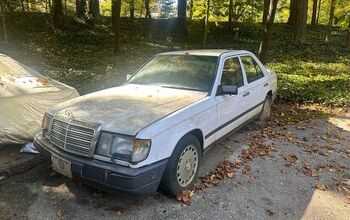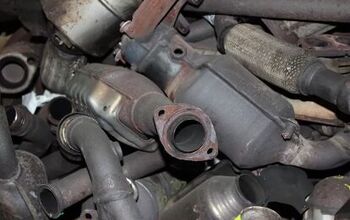The Takata Recall Continues; Now Includes 1.4 Million Additional Vehicles

The largest automotive recall in history just got a little more inclusive. Takata is recalling another 1.4 million vehicles after the airbag-related death of a BMW driver. The German manufacturer has issued three recalls covering roughly 116,000 U.S. vehicles containing the faulty equipment, saying it is aware of at least one fatality in Australia, plus a few injuries.
By now, you’re probably familiar with the issue. Takata supplied tens of millions of defective air-bag inflators over several years. The units are prone to exploding in the event of a crash, spraying metal shrapnel inside the cabin, after its propellant becomes compromised by nothing more than moisture. This has led to many senseless deaths, the largest automotive recall in history, and Takata declaring bankruptcy two years ago before its purchase by China’s Ningbo Joyson Electronic Corp.
The supplier issued a letter to the National Highway Traffic Safety Administration (NHTSA) in November notifying it of the recall. Bloomberg reports that the new inflator issue stems from a manufacturing defect affects inflators containing a non-azide propellant — not the ammonium nitrate mixture that turned previous Takata units into unintentional grenades.
In fact, NHTSA documents clearly specify that “these inflators do not contain phase stabilized ammonium nitrate (PSAN) propellant.” However, the end result is basically the same.
Takata claims “moist propellant subsequently dried could burn aggressively, increasing internal pressure” and, in a worst-case scenario, can cause the inflator to rupture. Unfortunately, the parts are old (manufactured between 1995 and 1999) and will be difficult to locate. Some of the vehicles impacted are definitely in an automotive graveyard by now. Others might be on their second or third owner.
From Bloomberg:
The parts maker said it produced and sold 4.45 million of the inflators globally during the time period covered by the recall. According to Takata’s safety recall report to the NHTSA, the number of inflators it produced for vehicles sold in the U.S. was “substantially smaller but is not precisely known at this time.” Because of the age of the potentially affected vehicles, only a portion remain in service, the company said.
While BMW is the only manufacturer to have issued recalls in the U.S. at this time, the issue also affects vehicles from Volkswagen, Audi, Honda, Toyota, and Mitsubishi. They’re all trying to figure out which models are affected and where they can be found before issuing recalls of their own. NHTSA documents suggests customers will begin receiving notifications early in 2020.
[Image: 360b/Shutterstock]

A staunch consumer advocate tracking industry trends and regulation. Before joining TTAC, Matt spent a decade working for marketing and research firms based in NYC. Clients included several of the world’s largest automakers, global tire brands, and aftermarket part suppliers. Dissatisfied with the corporate world and resentful of having to wear suits everyday, he pivoted to writing about cars. Since then, that man has become an ardent supporter of the right-to-repair movement, been interviewed on the auto industry by national radio broadcasts, driven more rental cars than anyone ever should, participated in amateur rallying events, and received the requisite minimum training as sanctioned by the SCCA. Handy with a wrench, Matt grew up surrounded by Detroit auto workers and managed to get a pizza delivery job before he was legally eligible. He later found himself driving box trucks through Manhattan, guaranteeing future sympathy for actual truckers. He continues to conduct research pertaining to the automotive sector as an independent contractor and has since moved back to his native Michigan, closer to where the cars are born. A contrarian, Matt claims to prefer understeer — stating that front and all-wheel drive vehicles cater best to his driving style.
More by Matt Posky
Latest Car Reviews
Read moreLatest Product Reviews
Read moreRecent Comments
- Zerofoo 5-valve 1.8T - and OK engine if you aren't in a hurry. These turbocharged engines had lots of lag - and the automatic transmission didn't help.Count on putting a timing belt on this immediately. The timing belt service interval, officially, was 100,000 miles and many didn't make it to that.
- Daniel J 19 inch wheels on an Elantra? Jeebus. I have 19s on my Mazda 6 and honestly wish they were 18s. I mean, I just picked up 4 tires at over 1000 bucks. The point of an Elantra is for it to be cheap. Put some 17s on it.
- ToolGuy 9 miles a day for 20 years. You didn't drive it, why should I? 😉
- Brian Uchida Laguna Seca, corkscrew, (drying track off in rental car prior to Superbike test session), at speed - turn 9 big Willow Springs racing a motorcycle,- at greater speed (but riding shotgun) - The Carrousel at Sears Point in a 1981 PA9 Osella 2 litre FIA racer with Eddie Lawson at the wheel! (apologies for not being brief!)
- Mister It wasn't helped any by the horrible fuel economy for what it was... something like 22mpg city, iirc.

































Comments
Join the conversation
It looks like Hyundai. And it is a Hyundai. It does not look upscale or elegant. I think Germans can sleep well at night.
And hopefully a manual transmission!